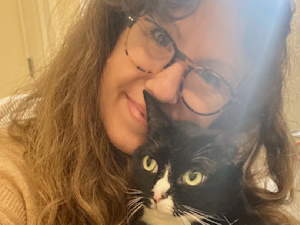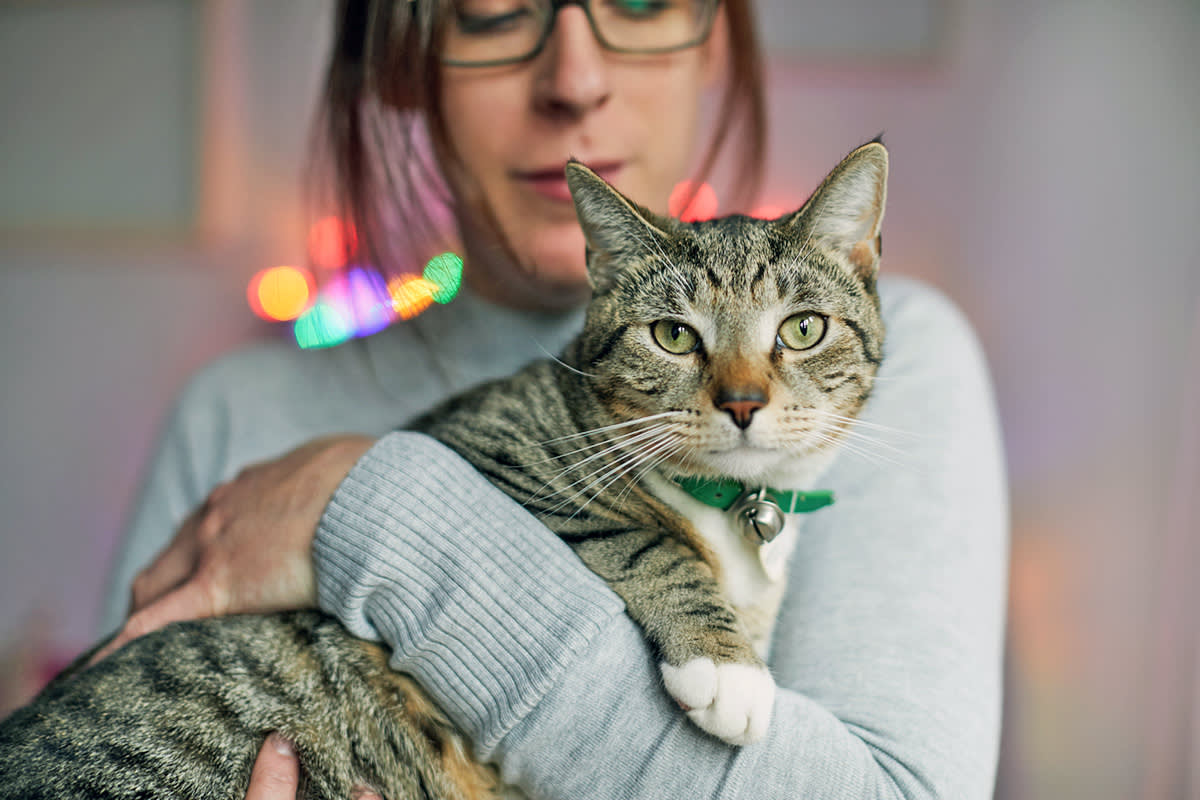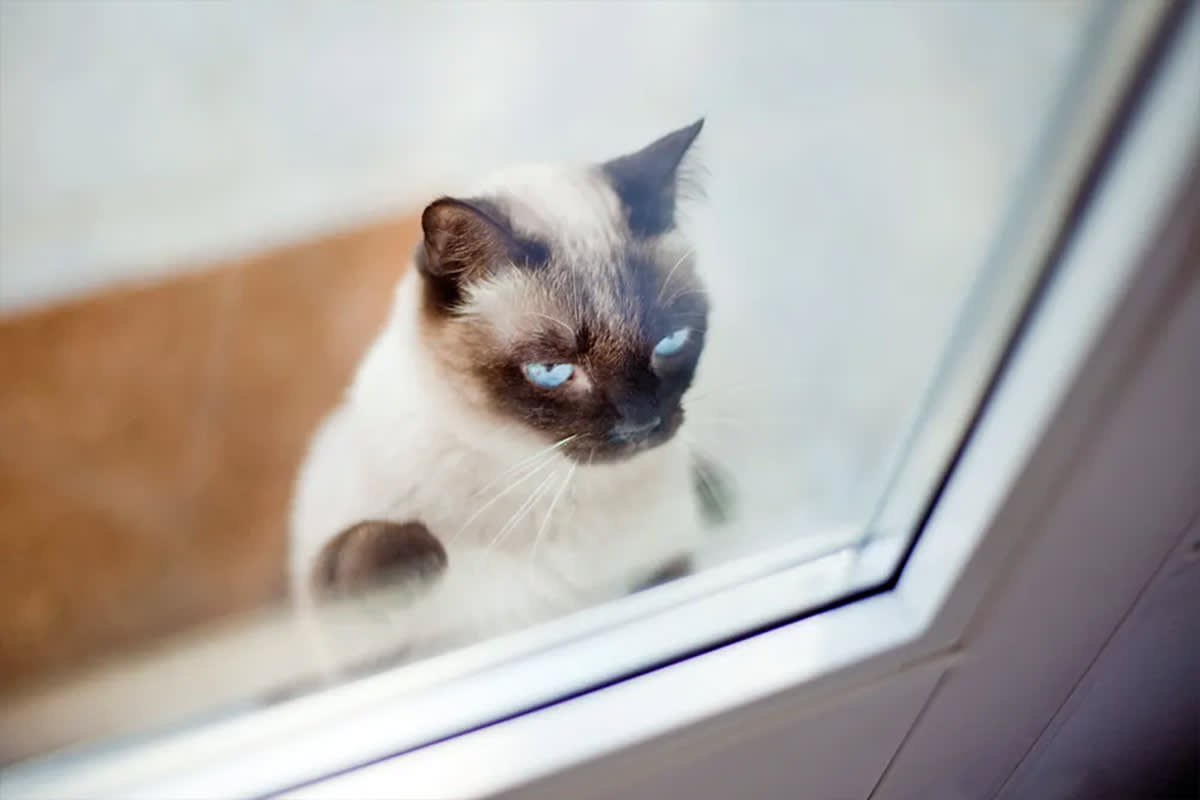Why Are So Many Cats Such Little Balls of Anxiety?
It seems like they have a pretty sweet deal. So, what’s the problem?

Share Article
Imagine never having to worry about anything for the rest of your life. You have a roof over your head, plenty of cozy spots to nap, and unlimited opportunity to do so. Someone is around to give you food, treats, and all the cuddles you can handle. You don’t have a job or any bills to pay. Seems pretty ideal, right? If this were my life, I don’t think I’d ever have a reason to feel anxious. And yet many cats who live this exact lifestyle are riddled with anxiety. They yowl, they run and hide, they groom themselves raw, they refuse to eat, they throw up. Why?
Veterinarian Dr. Preston Turano says that cats can suffer from anxietyopens in new tab for a multitude of reasons. They may miss you when you’re away, they may feel lonely, loud noises could be stressing them out, they could be scared, they may have an underlying medical problem that causes them anxiety, or something else could be upsetting them. Between 10 and 25 percent of cats experience anxiety, depending what source you’re looking at. “The exact number is hard to quantify because there is a lack of studies, and a number of cases are not recognized by pet parents,” Turano says.
Even cats who seem generally happy may show symptoms of anxiety, such as howling at night and overgrooming. “Cats are creatures of habit, so any changes in their environment — like moving, new pets, loud noises, or even rearranged furniture — can trigger anxiety,” says Dr. Nita Vasudevanopens in new tab, a veterinary consultant for Embrace Pet Insuranceopens in new tab. “Some cats are also more naturally anxious due to genetics, early weaning, lack of proper socialization, or past trauma,” Dr. Vasudevan says.
And while not having to invest in a trainer is one perk of being a cat parent versus a dog parent (though you can hire one for your cat!), this can backfire, when it comes to anxiety. “Unlike dogs, cats are often expected to cope without much structured training or enrichment, which can lead to chronic stress.”

How do cats tell you they’re anxious?
Howling, hiding, overgrooming, and fussiness about mealtime are only a few of the ways anxiety may manifest in your cat. “You may also see an increase in reactivity to certain stimuli or triggers,” Dr. Turano says.
Watch their body language, too. “Tucking or swooshing their tail, ears back or flat, and facial expressions such as squinting” are all clues that a cat is feeling anxious, he explains.
“Anxious cats might hide more than usual, act aggressively, overgroom (sometimes to the point of bald spots), urinate outside the litter box, or vocalize excessively,” Dr. Vasudevan says. “Some may also develop changes in appetite or exhibit restlessness, pacing, or clinginess. Subtle signs, like dilated pupils or twitching tails, are also worth noting.”
When is it time to consider anxiety medication for your cat?
If you’re concerned that your feline friend is suffering from anxiety — or their howls are keeping you awake at night — a visit to the veterinarian is the first step in helping them to feel better (and you to sleep better). “Treatment for anxiety starts with scheduling an appointment with your veterinarian,” Dr. Turano says. “They will be your best source to discuss the behaviors and symptoms that you are seeing at home and determining whether anxiety is an underlying cause.”
He explains that certain behaviors that look like anxiety could stem from something else. “For example, inappropriate urination may be a sign of anxiety, but it could also be caused by a urinary-tract infection, stones, or kidney disease. Overgrooming can also be associated with anxiety, but underlying allergies, skin infection, or parasites might cause this as well.”
At the vet’s office, your cat will likely be given a battery of diagnostic tests, including blood work and urinalysis. “Since our cats can’t talk to us, anxiety is usually diagnosed after other causes are ruled out,” Dr. Turano says. “It is extremely rare to put a cat on anxiety medications without running diagnostics to rule out other causes of the symptoms, whether it’s inappropriate urination, overgrooming, decreased appetite, or diarrhea.”
Anxiety meds aren’t always the answer.
“In severe cases, your veterinarian may prescribe medication when clinically indicated, and when the potential benefits outweigh the associated risks,” says veterinarian Dr. Victoria Carmella, an advisor at Pet Honestyopens in new tab. But some cat parents may be wary of putting their nervous kitty on medication — with good reason. “Some medications can be challenging to administer, and may have potential side effects, such as gastrointestinal upset,” Dr. Carmella adds.
If you’re reluctant to go the prescription medication route, you can try other options first. Dr. Vasudevan says that when treating cats with anxiety, she starts with environmental enrichment and behavior modification. “Puzzle feeders, vertical space, hiding spots, and consistent routines can help a lot. Feliway diffusers (which mimic calming pheromones) are often beneficial. If these strategies don’t work, I might recommend supplements like L-theanine or calming diets.” Dr. Turano mentions acupuncture and herbal therapy, and adds that depending on the underlying cause, changes in the household may help as well.
But sometimes, they are.
Sometimes, however, natural methods aren’t enough to help a very anxious cat. “In moderate to severe cases, medications such as fluoxetine, gabapentin, or trazodone can be very effective, especially when combined with behavioral support,” Dr. Vasudevan says. “Anxiety medication can significantly improve quality of life for cats who are suffering. They help manage behaviors that might otherwise damage the human-animal bond.” She adds that, because cats can be very sensitive to medications, it’s important never to try anything without veterinary guidance.
If your cat’s vet recommends medication, keep in mind that it likely won’t be needed forever. “Most of the time, the goal is not lifelong medicating, but rather to desensitize your cat to the underlying stress by making changes in the household,” says Dr. Turano. “The short-term gains from the medication will be to ease your cat’s anxiety and prevent, or stop, secondary behavioral issues like overgrooming.”
Finding the right medication and dosage can take some time, and depending on the medication, your cat may need to be monitored while they’re on it. Side effects can include increased sleepiness, an upset stomach, or changes in appetite.
“Medication isn’t a ‘quick fix.’ It works best as part of a broader plan that includes environmental changes and behavior support,” Dr. Vasudevan says. “Be patient. It can take several weeks to see improvement, and finding the right balance can take time. But it’s worth it when you see your cat more comfortable and confident.”

Elizabeth Laura Nelson
Elizabeth Laura Nelson is a writer and editor based in Brooklyn, New York, whose work has appeared in The New York Times, Jenny, Best Life, YourTango, Elite Daily, and more. She focuses her work on relationships, health and wellness, midlife, and lifestyle. As a child, Elizabeth was scared of cats (claws and teeth, yikes) but she has since gotten over her fear and now shares her home with three sweet and gentle feline companions who make life better (and cuddlier) every day.
Related articles
![Cat grabbing onto ledge of table and looking to the left]()
Why Does My Cat Follow Me Everywhere?
Yes, they are right behind you.
![A fluffy gray cat playfully swiping at a brown scruffy dog]()
5 Ways You’re Low-Key Ruining Your Cat’s Life
Just kidding, but you (or other pets) might be stressing them out more than necessary. Here’s how.
![cat staring at person on table]()
Why Does My Cat Stare at Me?
...Is it something you said?
Why Is My Cat Suddenly Clingy?
They’re never far away, but you’d like a little distance.
Why Does Your Cat Guard You When You Pee?
Sometimes you don’t need guarding—you just need a little privacy.






